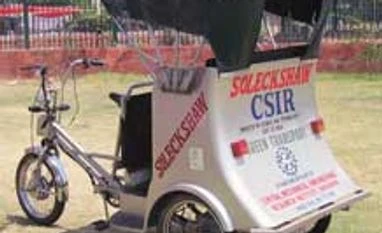The Bill, introduced by road transport and highways minister Nitin Gadkari on Monday, was passed by voice vote in the lower House.
Gadkari told the House the government wanted early passage of the Bill to end the plight of about 10 million poor rickshaw pullers, who struggle for their daily bread.
More From This Section
“The Bill is not brought keeping in view the Delhi elections,” he said, noting drivers and passengers of e-rickshaws are poor people and the court order had affected about 200,000 people who depend on the vehicles for their livelihood.
The government has also decided to provide low interest loan at four per cent a year to rickshaw pullers belonging to poor, backward, and minority communities to buy e-rickshaws.
Gadkari said his ministry, in consultation with experts and with help from Indian Institute of Technology, has attempted to introduce standardisation of the parts that go into making an e-rickshaw. This has made the vehicle safer, which even women can drive.
The government has also taken precautions to ensure that the drivers are the owners of these e-rickshaws, and prevent cartelisation of the sector where one person owns 50 or 100 such e-rickshaws and keeps drivers on daily wages. The non-polluting e-rickshaws will help reduce the inhuman cycle rickshaws and help generate employment. However, the minister cautioned that e-rickshaws should not be allowed in congested cities such as Mumbai, but could be allowed in its suburbs. The decision, however, lies with state governments. Gadkari said he has proposed to Prime Minister Narendra Modi and finance minister Arun Jaitley that loans to buy e-rickshaws be made available at zero per cent interest.
Gadkari also talked about his ministry's plan to run school buses and city transport buses on bio-fuel. He said the resistance to this move has come from the automobile manufacturers, but his government was determined to go ahead.
In October this year, the government had notified the rules for plying of e-rickshaws making driver's licence mandatory for operating them and limiting the maximum speed to 25 km an hour. It also notified the Central Motor Vehicles (16th Amendment) Rules, 2014, which allowed plying of special purpose battery-operated vehicles. The new rules provided that e-rickshaw will be allowed to carry four passengers and 40 kg luggage while e-carts would transport goods up to 310 kg.
On July 31, the Delhi High Court had banned plying of e-rickshaws on the roads of Delhi saying “prima-facie they are hazard to other traffic as well as citizens”.
The road transport and highways ministry has also amended Central Motor Vehicles Rules to exempt the e-rickshaw and e-cart drivers from the provision of having minimum qualification of 8th standard for obtaining a licence to drive a transport vehicle, provided the applicant undergoes a 10-day training from the registered e-rickshaw and e-cart Association or a manufacturer producing e-rickshaw or e-cart. Also, according to the existing Motor Vehicles Act, no person can be granted a learner’s licence to drive a transport vehicle unless he has held the driving licence for a period of at least one year. This criteria has been done away with for e-rickshaw and e-cart drivers.
)